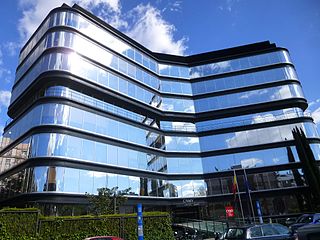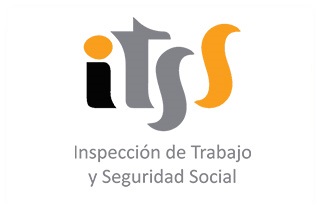
The Central American Parliament, also known as PARLACEN, is the political institution and parliamentary body of the Central American Integration System (SICA). Its headquarters are in Guatemala City.

The Bank of Spain is the central bank of Spain. Established in Madrid in 1782 by Charles III, today the bank is a member of the European System of Central Banks and is also Spain's national competent authority for banking supervision within the Single Supervisory Mechanism. It's activity is regulated by the Bank of Spain Autonomy Act.

The European Trade Union Confederation (ETUC) is the major trade union organisation representing workers at the European level. European integration has reinforced the EU's role in economic, employment and social policy throughout the 27 member states. The ETUC is a European social partner, which means that the European Commission consults it when developing social and economic policies. It also negotiates autonomous agreements and work programmes with European employers. And it coordinates the national and sectoral policies of its affiliates on social and economic matters, particularly in the framework of the EU institutional processes, including European economic governance and the EU Semester.
The social economy is formed by a rich diversity of enterprises and organisations, such as cooperatives, mutuals, associations, foundations, social enterprises and paritarian institutions, sharing common values and features:

The Hellenic Parliament, also known as the Parliament of the Hellenes or Greek Parliament, is the Parliament of Greece, located in the Old Royal Palace, overlooking Syntagma Square in Athens. The Parliament is the supreme democratic institution that represents the citizens through an elected body of Members of Parliament (MPs).

In Greece, the Hellenic Court of Audit is The Supreme Audit Institution of the Hellenic Republic, auditing the use of public funds in Greece according to the principles of legality, regularity and sound financial management. Synedrio is also the Supreme Financial Court, one of the three Supreme Courts of Justice, grounded on the Constitution, provides for its jurisdictional, advisory and auditing competences.
Cabildo Insular de Tenerife is the governing body of the island of Tenerife. It was established on 16 March 1913 in Santa Cruz de Tenerife, in a session held by the City Council. It was, at that time, the first corporation. The Cabildo of Tenerife, like the other councils of the Canary Islands, enjoys a number of local powers as contained in the Statute of Autonomy of the Canaries, other powers are delegated to the ministries of the territorial government.

The Central American Integration System has been the economic and political organization of Central American states since 1 February 1993. On 13 December 1991, the ODECA countries signed the Protocol of Tegucigalpa, extending earlier cooperation for regional peace, political freedom, democracy and economic development. SICA's General Secretariat is in El Salvador.

The Tribunal de Cuentas is the supreme governmental accounting body of Spain responsible of the comptrolling of the public accounts and the auditing of the accountancy of the political parties, in accordance with the Constitution and its Organic Law.

The Ministry of Economic Affairs and Digital Transformation (MINECO) is the department of the Government of Spain responsible for the proposing and carrying out the government policy on economic affairs, business support and reforms to improve economic potential growth as well as acting as the communication channel with the European Union and other economic and financial international organizations in this matters. Likewise, this department is responsible for the telecommunications policy and the digital transformation.

The League of Nations was established with three main constitutional organs: the Assembly; the Council; the Permanent Secretariat. The two essential wings of the League were the Permanent Court of International Justice and the International Labour Organization.

The St. Petersburg International Economic Forum is an annual Russian business event for the economic sector, which has been held in St. Petersburg since 1997, and under the auspices of the Russian President since 2005. Each year, more than 10,000 people from over 120 different countries take part. The Forum brings together the chief executives of major Russian and international companies, heads of state, political leaders, prime ministers, deputy prime ministers, departmental ministers, and governors.

The National Securities Market Commission is the Spanish government agency responsible for the financial regulation of the securities markets in Spain. It is an independent agency that falls under the Ministry of Economy.
The International Association of Economic and Social Councils and Similar Institutions, an association under Dutch law, is established in Brussels, Belgium and has been founded on 1 July 1999, in Port Louis, Mauritius.

The President of the Supreme Court and also President of the General Council of the Judiciary of Spain is the highest judicial authority of the Kingdom of Spain and holds the representation of the judicial branch and its governing body, the CGPJ. The office of President of the Supreme Court is foreseen in the Constitution as well as giving to the president the presidency of the General Council of the Judiciary. As a parliamentary monarchy, the President of the Supreme Court is appointed by the Monarch after being nominated by the Plenary of the General Council of the Judiciary, who serves until the end of its 5-years-term, its dismissal by the GCJ or its resignation.
Supreme Court of Azerbaijan is the highest court instance and final court of appeal of three-staged judicial system in Azerbaijan. Established in pursuant Article 131 of the Constitution of the Republic of Azerbaijan and Article 77 of the Law "on Courts and Judges". Supreme Court has competence to carry out justice on civil, criminal disputes and other cases related to the execution of general or specialized courts. Despite being established in Baku, its jurisdiction apply to entire territory of the Republic of Azerbaijan.

The Labour and Social Security Inspectorate (ITSS) is a Spanish autonomous agency in charge of the control of the compliance with labour and social security legislation. It also offers technical advice and, where appropriate, conciliation, mediation and arbitration in these matters. The ITSS is, therefore, the apex of the Labour and Social Security Inspection System.

The Catalan Labour, Economic and Social Affairs Council (CTESC) is a consultative and advisory body to the Government of Catalonia in socioeconomic, labour and occupational matters. It was created under Law 3/1997, of May 16, and Law 7/2005, of June 8, developed by Decree 43/2007 of February 20 and by the Internal Regulation, which established its new regulatory framework.
The National Institute for Safety and Health at Work is an autonomous agency of the Government of Spain. The INSST is considered a technical-scientific agency entrusted with the task of analyze and research on safety and health conditions at work, as well of promoting and supporting the improvement of them, in order to achieve a decrease in occupational hazards, work accidents and occupational diseases.

The Economic and Social Council of the Dominican Republic is an advisory entity permanently ascribed to the Executive Branch of the Government of the Dominican Republic. It is responsible for advising the government on economic, social, and labor matters with a goal to construct and strengthen social peace.















